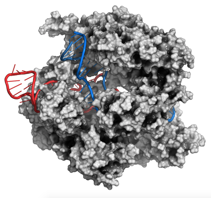
New CRISPR System Enables Temporary Gene Editing
November 8, 2017| |
 CRISPR, one of the new breeding techniques, has just gotten better. A new enzyme called Cas13 has been developed to temporarily modify RNA. This new CRISPR system called RNA Editing for Programmable A to I Replacement (REPAIR) enables targeting specific RNA letters or nucleotides involved in single-base changes. The results of the study conducted by scientists from Broad Institute of MIT and Harvard is published in Science.
CRISPR, one of the new breeding techniques, has just gotten better. A new enzyme called Cas13 has been developed to temporarily modify RNA. This new CRISPR system called RNA Editing for Programmable A to I Replacement (REPAIR) enables targeting specific RNA letters or nucleotides involved in single-base changes. The results of the study conducted by scientists from Broad Institute of MIT and Harvard is published in Science.CRISPR-Cas9 was developed to edit specific parts of the genome permanently. With REPAIR, scientists can target single bits of messenger RNA, which can be transient or even reversed. The edited portion may be degraded over a period of time and the modifications made in the cell will also disappear. Thus, REPAIR dispels safety concerns faced by the CRISPR-Cas9 system. It also promised a broad application for research, medicine, and biotechnology.
For more details, read the research article in Science and the news release in Vox.
| |
Biotech Updates is a weekly newsletter of ISAAA, a not-for-profit organization. It is distributed for free to over 22,000 subscribers worldwide to inform them about the key developments in biosciences, especially in biotechnology. Your support will help us in our mission to feed the world with knowledge. You can help by donating as little as $10.
-
See more articles:
-
News from Around the World
- Biotech Players Discuss International Agreements Related to Agri-biotech
- Africa to Benefit as Plant Genetic Treaty Plans to Expand its Resource Bank
- Kenyan Scientists Find New Striga Resistance Genes in Wild Sorghum
- Asparagus Genome Answers Questions About Origin and Early Evolution of Sex Chromosomes
- Discovery on Circadian Clock Could Help Boost Water Efficiency of Plants
- Vitamin E in Maize Could Lead to More Nutritious Crop
- USDA to Re-engage Stakeholders on Revisions to Biotech Regulation
- Bangladesh Government to Provide Incentives for Bt Brinjal Farmers
-
Research Highlights
- Co-expression of AtNHX1 and Bar Genes Improves Both Salinity and Herbicide Tolerances in Mungbean
-
Beyond Crop Biotech
- Researchers Find Differentially-Expressed Genes Between Normal and Malformed Flowers in Sugar Apple
- Dutch Scientists Decode Tulip Genome, The Biggest Genome Ever Sequenced
-
Announcements
- Genome Engineering and Synthetic Biology
- Webcast: Science of Science Communication III
-
Plant
- CRISPR-Cas9-Mediated Genome Editing of Cassava
- New CRISPR System Enables Temporary Gene Editing
-
Read the latest: - Biotech Updates (December 17, 2025)
- Gene Editing Supplement (December 17, 2025)
- Gene Drive Supplement (February 22, 2023)
-
Subscribe to BU: - Share
- Tweet
